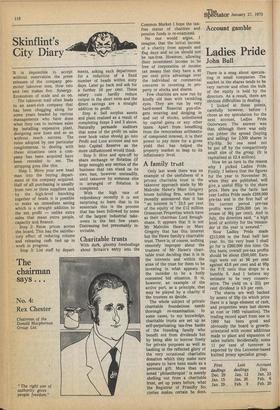Charitable trusts
With dark, gloomy forebodings about Britain's entry into the Common Market I hope the taxfree status of charities and pension funds is re-examined.
No one would argue, I imagine, that the initial income of a charity from appeals and flag days and so on should not be tax-free. However, allowing their investment income to be free of corporation or income tax means that they have a 40 per cent price advantage over the individual or commercial concerns in investing in property or stocks and shares.
Few charities are now run by kindly old men with twinkling eyes. They are run by very hard-nosed financial gun-slingers weaving and dodging in and out of stocks, unbothered by capital gains or any other taxes. Apart from benefiting from the remorseless arithmetic of compound interest, it is their power to pay more for a given yield that has helped the property market to leap to its inflationary level.
A family trust
Only last week there was an example of the usefulness of a private charitable trust in the takeover approach Made by Mr Malcolm Hawe's Marc Gregory house building firm, which has recently announced that it has "an interest in" 23.5 per cent of the equity of the £12 million Greencoat Properties which have as their chairman Lord Broughshane. It appears that it is not Mr Malcolm Hawe or Marc Gregory that has this interest but the Hawe family's charitable trust. There is, of course, nothing remotely improper about the trustees of Mr Hawe's charitable trust deciding that it is in the interests and within the aims of the trust for them to be investing in what appears to the outsider to be a hotly contested bid situation. It is, however, an example of the active part, as a principle, that may be played by a charity if the trustees so decide.
The whole subject of private charitable foundations needs thorough re-examination. In some cases, to my knowledge, charitable trusts are set up as self-perpetuating tax-free banks of the founding family who benefit not from dividends but by being able to borrow freely for private purposes as well as basking in the reflected glory of the very occasional charitable donation which they make sure appears to have been made as a personal gift. More than one noted ' philanthropist ' is merely shelling out from a charitable trust, set up years before, what the Registrar of Friendly Societies makes certain he does.


































 Previous page
Previous page